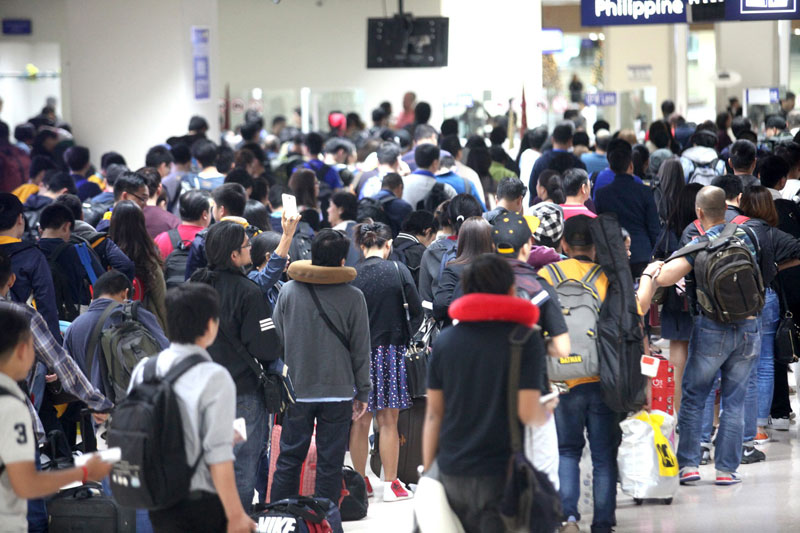Kuwait deployment ban remains as government reviews labor agreements

Foreign Affairs Undersecretary for Strategic Communication and Research Ernesto Abella said President Duterte was clear in his instructions to ensure that Filipino migrant workers are adequately protected in host countries abroad. Rudy Santos
MANILA, Philippines — The Philippines will not lift the ban on deployment to Kuwait anytime soon pending the review of labor agreements, an official of the Department of Foreign Affairs (DFA) said yesterday.
Foreign Affairs Undersecretary for Strategic Communication and Research Ernesto Abella said President Duterte was clear in his instructions to ensure that Filipino migrant workers are adequately protected in host countries abroad.
“There’ll be no lifting. The President said his priority is not so much the economics because he said we can source the economic benefits from others just as long as rights are protected,” Abella said.
The DFA Office of Middle East and African Affairs (OMEAA) said agreements on labor cooperation with Kuwait, Saudi Arabia, Lebanon and Israel are under negotiation.
The agreements designed to improve the working conditions and protect the rights of migrant workers, are being fast-tracked.
“They’re in various stages of negotiation so I can’t say they’re going to be passed or approved. They’re all under negotiation,” said DFA OMEAA executive director Raymond Balatbat. “The President’s instruction is to fast-track it.”
The DFA said yesterday there is no date yet for the visit of President Duterte to Kuwait.
Abella said the invitation for the President to visit Kuwait has been extended and conveyed to the Office of the President.
“We defer to the Office of the President as to the day when the proposed visit will push through. The invitation was for March 5 and 6, 2018,” Abella said in a press briefing.
Foreign Affairs Secretary Alan Peter Cayetano said the President will not visit Kuwait without direction towards solving the problems of Filipinos there.
He said Kuwaiti Ambassador Saleh Ahmad Althwaik followed up on the invitation during their meeting at the DFA on Feb. 15.
Cayetano said he explained to the ambassador that “before the President can go, there should be substantial agreement and firm commitments with each other.”
A total deployment ban on Kuwait-bound workers was announced by the Department of Labor and Employment (DOLE) on Feb. 12, in accordance with the President’s directive to Labor Secretary Silvestre Bello III, after the body of murdered domestic helper Joanna Demafelis was found stuffed in a freezer in Kuwait.
The President announced the possibility of expanding the deployment ban to other countries.
According to Abella, certain employers of Filipino household workers in the Middle East are in the habit of trading foreign domestic helpers among families.
“From our side an audit is being made and we’re also taking guidance from the President’s statement that the primary consideration is the welfare and safety of OFWs (overseas Filipino workers) and this has priority over economic gains,” he said.
The kafala system or sponsorship is used to monitor migrant laborers working primarily in the construction and domestic sectors in Lebanon, Bahrain, Iraq, Jordan, Kuwait, Oman, Qatar, Saudi Arabia and the UAE.
The kafala system requires all unskilled laborers to have an in-country sponsor, usually their employer, who is responsible for their visa and legal status.
“The kafala system is a sponsorship system in the Middle East in the sense that the kafala is not just the sponsor or employer as understood in the West but becomes the virtual owner of the household service worker. This is not officially stated but becomes a sort of practice,” Abella said.
He noted that this is manifested in slavery conditions – no days off, no food, two hours sleep and also includes sexual slavery.
Abella said ending or removing the kafala system was discussed during a Senate hearing and was recommended to be included in the memorandum of understanding (MOU) that will be signed by the Philippines and Kuwait.
“(Removing kafala) has been recommended. One of the officials suggested that the ban must remain until that’s lifted,” Abella said. “It’s a deep-seated cultural practice easier legislated than actually practiced. However, that’s being recommended that the system must be officially addressed.”
“As far as this is going to be framed, in what part of the MOU, we’re not privy at this stage of the development of the language,” he added.
The government, he said, is pushing for a Cabinet cluster to be able to recommend the actual steps needed to protect the rights and benefits of the workers.
“We’re pushing for a Cabinet cluster on OFW concerns and eventually an inter-agency on OFWs to facilitate these concerns,” Abella said.
Domestic helper Hydee Caro had filed a complaint with the Philippine Overseas Employment Administration (POEA) against her local recruitment agency First Personnel Services Inc. for failing to monitor her situation in Saudi Arabia where she was a victim of the kafala system.
The POEA is investigating Caro’s complaint, including the alleged “sale” or transfer of her contract to another employer without her consent.
The transfer of a Filipina maid should also be reported and approved by the Philippine Overseas Labor Office (POLO) so that an officer will be able to monitor her whereabouts.
It is also a responsibility of the foreign recruitment agency that deployed the worker to the original sponsor.
The transfer of a worker to a different employer without the approval of the POLO officer is considered a violation of the Philippine-Saudi Special labor agreement and also a violation of POEA rules.
Caro, who arrived in the country in April 2017 from Buraydah, Saudi Arabia, complained that she worked for 11 months and was transferred three times to different employers.
She complained that one of her employers tried to rape her and when she resisted, she was arrested by the Saudi police after her employer accused her of theft.
Caro said she applied with First Personnel Services Inc. in Ermita, Manila last year and was deployed immediately to Al-Robaegh in Buraydah, Saudi Arabia.
She said her original employer did not give her proper food and when she complained, she was accused of theft and was sent to a Saudi jail.
After spending four days in jail, Caro was released to a certain Abdulaziz who reportedly paid her previous employer 22,000 riyals to become her new employer.
She worked for Abdulaziz for two months and was later transferred to another Saudi employer identified as Naif who tried to molest her inside her bedroom.
She resisted and Naif tried to force her out of the house and into the desert. The maid locked herself inside the bathroom until the Saudi police arrived and took custody of her.
Caro later ended up in another household. Her new employer was better and allowed her to go home after serving them for three months.
The relatives of Caro said that her local recruiter failed to help her even though her relatives had informed the recruiter of her problems in Saudi. – Rudy Santos
- Latest
- Trending




























